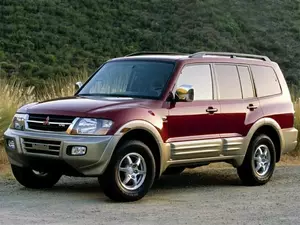


2020 Pajero Sport III (facelift 2019)

2016 Pajero Sport III

2015 Pajero IV (facelift 2015)

2012 Pajero IV (facelift 2012)

2008 Pajero Sport II

2006 Pajero IV

1998 Pajero Pinin (H60)

2001 Pajero III

1996 Pajero Sport I (K90)

1991 Pajero II (V2_W,V4_W)

1998 Pajero IO (H60)

1991 Pajero II Metal Top (V2_W,V4_W)

1995 Pajero Junior

1994 Pajero Mini

| Vehicle | Curb weight | Difference from world's smallest | Weight to power ratio | 0—60 mph acceleration ratio | Consumption ratio |
|---|---|---|---|---|---|
| 2.4 DI-D |
2075 kg / 4575 lbs |
1650 kg (3638 lbs) heavier | 11 kg to 1 hp | - | - |
| Vehicle | 2.4 DI-D |
|---|---|
| Curb weight |
2075 kg / 4575 lbs |
| Difference from world's smallest | 1650 kg (1650 lbs) heavier |
| Weight to power ratio | 11 kg to 1 hp |
| 0—60 mph acceleration ratio | - |
| Consumption ratio | - |

| Vehicle | Curb weight | Difference from world's smallest | Weight to power ratio | 0—60 mph acceleration ratio | Consumption ratio |
|---|---|---|---|---|---|
| 2.5 DI-D |
2000 kg / 4410 lbs |
1575 kg (3473 lbs) heavier | 15 kg to 1 hp | - | - |
| 2.4 DI-D |
2010 kg / 4432 lbs |
1585 kg (3495 lbs) heavier | 11 kg to 1 hp | - | - |
| 3.0 V6 MIVEC |
1980 kg / 4366 lbs |
1555 kg (3429 lbs) heavier | 9 kg to 1 hp | - | - |
| Vehicle | 2.5 DI-D |
|---|---|
| Curb weight |
2000 kg / 4410 lbs |
| Difference from world's smallest | 1575 kg (1575 lbs) heavier |
| Weight to power ratio | 15 kg to 1 hp |
| 0—60 mph acceleration ratio | - |
| Consumption ratio | - |
| Vehicle | 2.4 DI-D |
| Curb weight |
2010 kg / 4432 lbs |
| Difference from world's smallest | 1585 kg (1585 lbs) heavier |
| Weight to power ratio | 11 kg to 1 hp |
| 0—60 mph acceleration ratio | - |
| Consumption ratio | - |
| Vehicle | 3.0 V6 MIVEC |
| Curb weight |
1980 kg / 4366 lbs |
| Difference from world's smallest | 1555 kg (1555 lbs) heavier |
| Weight to power ratio | 9 kg to 1 hp |
| 0—60 mph acceleration ratio | - |
| Consumption ratio | - |

| Vehicle | Curb weight | Difference from world's smallest | Weight to power ratio | 0—60 mph acceleration ratio | Consumption ratio |
|---|---|---|---|---|---|
| 3.2 DI-DC |
2375 kg / 5237 lbs |
1950 kg (4300 lbs) heavier | 13 kg to 1 hp | 226 kg/s (498 lbs/s) |
255 kg/L (562 lbs/L) |
| Vehicle | 3.2 DI-DC |
|---|---|
| Curb weight |
2375 kg / 5237 lbs |
| Difference from world's smallest | 1950 kg (1950 lbs) heavier |
| Weight to power ratio | 13 kg to 1 hp |
| 0—60 mph acceleration ratio | 226 kg/s (498 lbs/s) |
| Consumption ratio |
255 kg/L (562 lbs/L) |

| Vehicle | Curb weight | Difference from world's smallest | Weight to power ratio | 0—60 mph acceleration ratio | Consumption ratio |
|---|---|---|---|---|---|
| 3.2 DI-DC |
2265 kg / 4994 lbs |
1840 kg (4057 lbs) heavier | 11 kg to 1 hp | 216 kg/s (476 lbs/s) |
266 kg/L (587 lbs/L) |
| Vehicle | 3.2 DI-DC |
|---|---|
| Curb weight |
2265 kg / 4994 lbs |
| Difference from world's smallest | 1840 kg (1840 lbs) heavier |
| Weight to power ratio | 11 kg to 1 hp |
| 0—60 mph acceleration ratio | 216 kg/s (476 lbs/s) |
| Consumption ratio |
266 kg/L (587 lbs/L) |

| Vehicle | Curb weight | Difference from world's smallest | Weight to power ratio | 0—60 mph acceleration ratio | Consumption ratio |
|---|---|---|---|---|---|
| 3.0 V6 |
1965 kg / 4333 lbs |
1540 kg (3396 lbs) heavier | 9 kg to 1 hp | 184 kg/s (406 lbs/s) | - |
| Vehicle | 3.0 V6 |
|---|---|
| Curb weight |
1965 kg / 4333 lbs |
| Difference from world's smallest | 1540 kg (1540 lbs) heavier |
| Weight to power ratio | 9 kg to 1 hp |
| 0—60 mph acceleration ratio | 184 kg/s (406 lbs/s) |
| Consumption ratio | - |

| Vehicle | Curb weight | Difference from world's smallest | Weight to power ratio | 0—60 mph acceleration ratio | Consumption ratio |
|---|---|---|---|---|---|
| 3.2 Di-DC |
2310 kg / 5094 lbs |
1885 kg (4157 lbs) heavier | 14 kg to 1 hp | 185 kg/s (408 lbs/s) |
197 kg/L (434 lbs/L) |
| 3.0i V6 |
2310 kg / 5094 lbs |
1885 kg (4157 lbs) heavier | 13 kg to 1 hp | - | - |
| 3.8 i V6 24V MIVEC |
2215 kg / 4884 lbs |
1790 kg (3947 lbs) heavier | 9 kg to 1 hp | 215 kg/s (474 lbs/s) |
164 kg/L (362 lbs/L) |
| Vehicle | 3.2 Di-DC |
|---|---|
| Curb weight |
2310 kg / 5094 lbs |
| Difference from world's smallest | 1885 kg (1885 lbs) heavier |
| Weight to power ratio | 14 kg to 1 hp |
| 0—60 mph acceleration ratio | 185 kg/s (408 lbs/s) |
| Consumption ratio |
197 kg/L (434 lbs/L) |
| Vehicle | 3.0i V6 |
| Curb weight |
2310 kg / 5094 lbs |
| Difference from world's smallest | 1885 kg (1885 lbs) heavier |
| Weight to power ratio | 13 kg to 1 hp |
| 0—60 mph acceleration ratio | - |
| Consumption ratio | - |
| Vehicle | 3.8 i V6 24V MIVEC |
| Curb weight |
2215 kg / 4884 lbs |
| Difference from world's smallest | 1790 kg (1790 lbs) heavier |
| Weight to power ratio | 9 kg to 1 hp |
| 0—60 mph acceleration ratio | 215 kg/s (474 lbs/s) |
| Consumption ratio |
164 kg/L (362 lbs/L) |

| Vehicle | Curb weight | Difference from world's smallest | Weight to power ratio | 0—60 mph acceleration ratio | Consumption ratio |
|---|---|---|---|---|---|
| 2.0 GDI 16V |
1481 kg / 3266 lbs |
1056 kg (2329 lbs) heavier | 11 kg to 1 hp | 144 kg/s (318 lbs/s) |
156 kg/L (344 lbs/L) |
| 1.8 i 16V |
1340 kg / 2955 lbs |
915 kg (2018 lbs) heavier | 12 kg to 1 hp | 102 kg/s (225 lbs/s) |
134 kg/L (295 lbs/L) |
| 1.8 GDI |
1210 kg / 2668 lbs |
785 kg (1731 lbs) heavier | 10 kg to 1 hp | 125 kg/s (276 lbs/s) | - |
| Vehicle | 2.0 GDI 16V |
|---|---|
| Curb weight |
1481 kg / 3266 lbs |
| Difference from world's smallest | 1056 kg (1056 lbs) heavier |
| Weight to power ratio | 11 kg to 1 hp |
| 0—60 mph acceleration ratio | 144 kg/s (318 lbs/s) |
| Consumption ratio |
156 kg/L (344 lbs/L) |
| Vehicle | 1.8 i 16V |
| Curb weight |
1340 kg / 2955 lbs |
| Difference from world's smallest | 915 kg (915 lbs) heavier |
| Weight to power ratio | 12 kg to 1 hp |
| 0—60 mph acceleration ratio | 102 kg/s (225 lbs/s) |
| Consumption ratio |
134 kg/L (295 lbs/L) |
| Vehicle | 1.8 GDI |
| Curb weight |
1210 kg / 2668 lbs |
| Difference from world's smallest | 785 kg (785 lbs) heavier |
| Weight to power ratio | 10 kg to 1 hp |
| 0—60 mph acceleration ratio | 125 kg/s (276 lbs/s) |
| Consumption ratio | - |

| Vehicle | Curb weight | Difference from world's smallest | Weight to power ratio | 0—60 mph acceleration ratio | Consumption ratio |
|---|---|---|---|---|---|
| 3.5 V6 GDI |
2135 kg / 4708 lbs |
1710 kg (3771 lbs) heavier | 11 kg to 1 hp | 209 kg/s (461 lbs/s) |
167 kg/L (368 lbs/L) |
| 3.2 DI-D |
2000 kg / 4410 lbs |
1575 kg (3473 lbs) heavier | 12 kg to 1 hp | 183 kg/s (404 lbs/s) |
211 kg/L (465 lbs/L) |
| 2.5 TD |
1785 kg / 3936 lbs |
1360 kg (2999 lbs) heavier | 16 kg to 1 hp | 110 kg/s (243 lbs/s) | - |
| Vehicle | 3.5 V6 GDI |
|---|---|
| Curb weight |
2135 kg / 4708 lbs |
| Difference from world's smallest | 1710 kg (1710 lbs) heavier |
| Weight to power ratio | 11 kg to 1 hp |
| 0—60 mph acceleration ratio | 209 kg/s (461 lbs/s) |
| Consumption ratio |
167 kg/L (368 lbs/L) |
| Vehicle | 3.2 DI-D |
| Curb weight |
2000 kg / 4410 lbs |
| Difference from world's smallest | 1575 kg (1575 lbs) heavier |
| Weight to power ratio | 12 kg to 1 hp |
| 0—60 mph acceleration ratio | 183 kg/s (404 lbs/s) |
| Consumption ratio |
211 kg/L (465 lbs/L) |
| Vehicle | 2.5 TD |
| Curb weight |
1785 kg / 3936 lbs |
| Difference from world's smallest | 1360 kg (1360 lbs) heavier |
| Weight to power ratio | 16 kg to 1 hp |
| 0—60 mph acceleration ratio | 110 kg/s (243 lbs/s) |
| Consumption ratio | - |

| Vehicle | Curb weight | Difference from world's smallest | Weight to power ratio | 0—60 mph acceleration ratio | Consumption ratio |
|---|---|---|---|---|---|
| 3.0 i V6 24V |
1920 kg / 4234 lbs |
1495 kg (3297 lbs) heavier | 11 kg to 1 hp | 175 kg/s (386 lbs/s) | - |
| 2.5 TD |
1830 kg / 4035 lbs |
1405 kg (3098 lbs) heavier | 14 kg to 1 hp | 107 kg/s (236 lbs/s) | - |
| 2.5 TD |
1970 kg / 4344 lbs |
1545 kg (3407 lbs) heavier | 20 kg to 1 hp | 112 kg/s (247 lbs/s) | - |
| Vehicle | 3.0 i V6 24V |
|---|---|
| Curb weight |
1920 kg / 4234 lbs |
| Difference from world's smallest | 1495 kg (1495 lbs) heavier |
| Weight to power ratio | 11 kg to 1 hp |
| 0—60 mph acceleration ratio | 175 kg/s (386 lbs/s) |
| Consumption ratio | - |
| Vehicle | 2.5 TD |
| Curb weight |
1830 kg / 4035 lbs |
| Difference from world's smallest | 1405 kg (1405 lbs) heavier |
| Weight to power ratio | 14 kg to 1 hp |
| 0—60 mph acceleration ratio | 107 kg/s (236 lbs/s) |
| Consumption ratio | - |
| Vehicle | 2.5 TD |
| Curb weight |
1970 kg / 4344 lbs |
| Difference from world's smallest | 1545 kg (1545 lbs) heavier |
| Weight to power ratio | 20 kg to 1 hp |
| 0—60 mph acceleration ratio | 112 kg/s (247 lbs/s) |
| Consumption ratio | - |

| Vehicle | Curb weight | Difference from world's smallest | Weight to power ratio | 0—60 mph acceleration ratio | Consumption ratio |
|---|---|---|---|---|---|
| 3.5 i V6 24V |
2085 kg / 4597 lbs |
1660 kg (3660 lbs) heavier | 10 kg to 1 hp | 209 kg/s (461 lbs/s) |
144 kg/L (318 lbs/L) |
| 3.0 i V6 24V |
2040 kg / 4498 lbs |
1615 kg (3561 lbs) heavier | 11 kg to 1 hp | 177 kg/s (390 lbs/s) |
147 kg/L (324 lbs/L) |
| 3.0 i V6 GLS |
2045 kg / 4509 lbs |
1620 kg (3572 lbs) heavier | 14 kg to 1 hp | 154 kg/s (340 lbs/s) |
146 kg/L (322 lbs/L) |
| 2.8 TD GLX |
2129 kg / 4694 lbs |
1704 kg (3757 lbs) heavier | 17 kg to 1 hp | 130 kg/s (287 lbs/s) |
173 kg/L (381 lbs/L) |
| 2.4i |
1875 kg / 4134 lbs |
1450 kg (3197 lbs) heavier | 13 kg to 1 hp | - | - |
| 2.5 TD GL |
1875 kg / 4134 lbs |
1450 kg (3197 lbs) heavier | 19 kg to 1 hp | 92 kg/s (203 lbs/s) |
164 kg/L (362 lbs/L) |
| 3.0 i V6 24V GLS |
1955 kg / 4311 lbs |
1530 kg (3374 lbs) heavier | 11 kg to 1 hp | 170 kg/s (375 lbs/s) | - |
| 3.5 i V6 24V GLS |
1985 kg / 4377 lbs |
1560 kg (3440 lbs) heavier | 10 kg to 1 hp | 186 kg/s (410 lbs/s) | - |
| 3.5 i V6 24V GDI |
2170 kg / 4785 lbs |
1745 kg (3848 lbs) heavier | 9 kg to 1 hp | 228 kg/s (503 lbs/s) | - |
| 3.5i MIVEC EVO |
2170 kg / 4785 lbs |
1745 kg (3848 lbs) heavier | 8 kg to 1 hp | - | - |
| Vehicle | 3.5 i V6 24V |
|---|---|
| Curb weight |
2085 kg / 4597 lbs |
| Difference from world's smallest | 1660 kg (1660 lbs) heavier |
| Weight to power ratio | 10 kg to 1 hp |
| 0—60 mph acceleration ratio | 209 kg/s (461 lbs/s) |
| Consumption ratio |
144 kg/L (318 lbs/L) |
| Vehicle | 3.0 i V6 24V |
| Curb weight |
2040 kg / 4498 lbs |
| Difference from world's smallest | 1615 kg (1615 lbs) heavier |
| Weight to power ratio | 11 kg to 1 hp |
| 0—60 mph acceleration ratio | 177 kg/s (390 lbs/s) |
| Consumption ratio |
147 kg/L (324 lbs/L) |
| Vehicle | 3.0 i V6 GLS |
| Curb weight |
2045 kg / 4509 lbs |
| Difference from world's smallest | 1620 kg (1620 lbs) heavier |
| Weight to power ratio | 14 kg to 1 hp |
| 0—60 mph acceleration ratio | 154 kg/s (340 lbs/s) |
| Consumption ratio |
146 kg/L (322 lbs/L) |
| Vehicle | 2.8 TD GLX |
| Curb weight |
2129 kg / 4694 lbs |
| Difference from world's smallest | 1704 kg (1704 lbs) heavier |
| Weight to power ratio | 17 kg to 1 hp |
| 0—60 mph acceleration ratio | 130 kg/s (287 lbs/s) |
| Consumption ratio |
173 kg/L (381 lbs/L) |
| Vehicle | 2.4i |
| Curb weight |
1875 kg / 4134 lbs |
| Difference from world's smallest | 1450 kg (1450 lbs) heavier |
| Weight to power ratio | 13 kg to 1 hp |
| 0—60 mph acceleration ratio | - |
| Consumption ratio | - |
| Vehicle | 2.5 TD GL |
| Curb weight |
1875 kg / 4134 lbs |
| Difference from world's smallest | 1450 kg (1450 lbs) heavier |
| Weight to power ratio | 19 kg to 1 hp |
| 0—60 mph acceleration ratio | 92 kg/s (203 lbs/s) |
| Consumption ratio |
164 kg/L (362 lbs/L) |
| Vehicle | 3.0 i V6 24V GLS |
| Curb weight |
1955 kg / 4311 lbs |
| Difference from world's smallest | 1530 kg (1530 lbs) heavier |
| Weight to power ratio | 11 kg to 1 hp |
| 0—60 mph acceleration ratio | 170 kg/s (375 lbs/s) |
| Consumption ratio | - |
| Vehicle | 3.5 i V6 24V GLS |
| Curb weight |
1985 kg / 4377 lbs |
| Difference from world's smallest | 1560 kg (1560 lbs) heavier |
| Weight to power ratio | 10 kg to 1 hp |
| 0—60 mph acceleration ratio | 186 kg/s (410 lbs/s) |
| Consumption ratio | - |
| Vehicle | 3.5 i V6 24V GDI |
| Curb weight |
2170 kg / 4785 lbs |
| Difference from world's smallest | 1745 kg (1745 lbs) heavier |
| Weight to power ratio | 9 kg to 1 hp |
| 0—60 mph acceleration ratio | 228 kg/s (503 lbs/s) |
| Consumption ratio | - |
| Vehicle | 3.5i MIVEC EVO |
| Curb weight |
2170 kg / 4785 lbs |
| Difference from world's smallest | 1745 kg (1745 lbs) heavier |
| Weight to power ratio | 8 kg to 1 hp |
| 0—60 mph acceleration ratio | - |
| Consumption ratio | - |

| Vehicle | Curb weight | Difference from world's smallest | Weight to power ratio | 0—60 mph acceleration ratio | Consumption ratio |
|---|---|---|---|---|---|
| 1.8 i 16V GDI 4WD |
1390 kg / 3065 lbs |
965 kg (2128 lbs) heavier | 9 kg to 1 hp | - | - |
| Vehicle | 1.8 i 16V GDI 4WD |
|---|---|
| Curb weight |
1390 kg / 3065 lbs |
| Difference from world's smallest | 965 kg (965 lbs) heavier |
| Weight to power ratio | 9 kg to 1 hp |
| 0—60 mph acceleration ratio | - |
| Consumption ratio | - |

| Vehicle | Curb weight | Difference from world's smallest | Weight to power ratio | 0—60 mph acceleration ratio | Consumption ratio |
|---|---|---|---|---|---|
| 3.5 i V6 24V |
1850 kg / 4079 lbs |
1425 kg (3142 lbs) heavier | 9 kg to 1 hp | 206 kg/s (454 lbs/s) |
130 kg/L (287 lbs/L) |
| 3.0 i V6 24V GLS |
1765 kg / 3892 lbs |
1340 kg (2955 lbs) heavier | 10 kg to 1 hp | 168 kg/s (370 lbs/s) | - |
| 2.5 TD GL |
1706 kg / 3762 lbs |
1281 kg (2825 lbs) heavier | 17 kg to 1 hp | 109 kg/s (240 lbs/s) | - |
| 2.8 TD GLS |
1910 kg / 4212 lbs |
1485 kg (3275 lbs) heavier | 15 kg to 1 hp | - |
163 kg/L (359 lbs/L) |
| 3.5 i V6 24V GDI |
1900 kg / 4190 lbs |
1475 kg (3253 lbs) heavier | 8 kg to 1 hp | 200 kg/s (441 lbs/s) | - |
| 3.5 i V6 24V GLS |
1800 kg / 3969 lbs |
1375 kg (3032 lbs) heavier | 9 kg to 1 hp | 191 kg/s (421 lbs/s) | - |
| Vehicle | 3.5 i V6 24V |
|---|---|
| Curb weight |
1850 kg / 4079 lbs |
| Difference from world's smallest | 1425 kg (1425 lbs) heavier |
| Weight to power ratio | 9 kg to 1 hp |
| 0—60 mph acceleration ratio | 206 kg/s (454 lbs/s) |
| Consumption ratio |
130 kg/L (287 lbs/L) |
| Vehicle | 3.0 i V6 24V GLS |
| Curb weight |
1765 kg / 3892 lbs |
| Difference from world's smallest | 1340 kg (1340 lbs) heavier |
| Weight to power ratio | 10 kg to 1 hp |
| 0—60 mph acceleration ratio | 168 kg/s (370 lbs/s) |
| Consumption ratio | - |
| Vehicle | 2.5 TD GL |
| Curb weight |
1706 kg / 3762 lbs |
| Difference from world's smallest | 1281 kg (1281 lbs) heavier |
| Weight to power ratio | 17 kg to 1 hp |
| 0—60 mph acceleration ratio | 109 kg/s (240 lbs/s) |
| Consumption ratio | - |
| Vehicle | 2.8 TD GLS |
| Curb weight |
1910 kg / 4212 lbs |
| Difference from world's smallest | 1485 kg (1485 lbs) heavier |
| Weight to power ratio | 15 kg to 1 hp |
| 0—60 mph acceleration ratio | - |
| Consumption ratio |
163 kg/L (359 lbs/L) |
| Vehicle | 3.5 i V6 24V GDI |
| Curb weight |
1900 kg / 4190 lbs |
| Difference from world's smallest | 1475 kg (1475 lbs) heavier |
| Weight to power ratio | 8 kg to 1 hp |
| 0—60 mph acceleration ratio | 200 kg/s (441 lbs/s) |
| Consumption ratio | - |
| Vehicle | 3.5 i V6 24V GLS |
| Curb weight |
1800 kg / 3969 lbs |
| Difference from world's smallest | 1375 kg (1375 lbs) heavier |
| Weight to power ratio | 9 kg to 1 hp |
| 0—60 mph acceleration ratio | 191 kg/s (421 lbs/s) |
| Consumption ratio | - |

| Vehicle | Curb weight | Difference from world's smallest | Weight to power ratio | 0—60 mph acceleration ratio | Consumption ratio |
|---|---|---|---|---|---|
| 1.1 |
960 kg / 2117 lbs |
535 kg (1180 lbs) heavier | 12 kg to 1 hp | - |
160 kg/L (353 lbs/L) |
| Vehicle | 1.1 |
|---|---|
| Curb weight |
960 kg / 2117 lbs |
| Difference from world's smallest | 535 kg (535 lbs) heavier |
| Weight to power ratio | 12 kg to 1 hp |
| 0—60 mph acceleration ratio | - |
| Consumption ratio |
160 kg/L (353 lbs/L) |

| Vehicle | Curb weight | Difference from world's smallest | Weight to power ratio | 0—60 mph acceleration ratio | Consumption ratio |
|---|---|---|---|---|---|
| 0.7 20V Turbo |
890 kg / 1962 lbs |
465 kg (1025 lbs) heavier | 14 kg to 1 hp | - | - |
| 0.7 16V |
910 kg / 2007 lbs |
485 kg (1070 lbs) heavier | 18 kg to 1 hp | - | - |
| Vehicle | 0.7 20V Turbo |
|---|---|
| Curb weight |
890 kg / 1962 lbs |
| Difference from world's smallest | 465 kg (465 lbs) heavier |
| Weight to power ratio | 14 kg to 1 hp |
| 0—60 mph acceleration ratio | - |
| Consumption ratio | - |
| Vehicle | 0.7 16V |
| Curb weight |
910 kg / 2007 lbs |
| Difference from world's smallest | 485 kg (485 lbs) heavier |
| Weight to power ratio | 18 kg to 1 hp |
| 0—60 mph acceleration ratio | - |
| Consumption ratio | - |